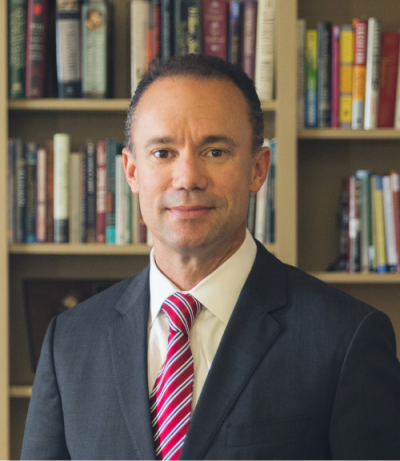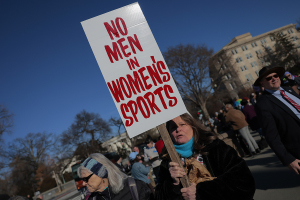Martin Luther King Jr.'s measured, people-power approach

During the past week of protest and riot, I have heard one question uttered over and over. Who can we turn to for unity? Or, What national voices are left who can speak across divides? I asked a group of college students, all selectively-chosen DC interns, these questions today (at the time of writing) during a Zoom seminar. The chat box remains blank.
I reintroduced the students, and perhaps we all need to be reintroduced, to Martin Luther King, Jr.’s potent “Letter from a Birmingham Jail” (1963). It is a sublime statement against injustice. It is also a challenge to not allow hatred to take root in our hearts.
King was responding, from his jail cell, to letters from local religious leaders in Birmingham, Alabama, who suggested that he and other civil rights activists were “outsiders” bringing discord to their fair city. He responds by nodding to John Donne: there is injustice in Birmingham and no man, no community, is an island unto itself. We are a part of the whole. We are the United States of America. Injustice in Birmingham is injustice in America.
King disagrees with the pastors. He did not bring discord to Birmingham — the strife was already there due to segregation. He then outlines the thoughtful, four-step process of his non-violent campaign. The campaign begins with the careful collection of facts which are then presented to civil authorities. Every effort should be made at negotiation before confrontation. Such had been tried, and utterly failed, in Birmingham.
The third step catches most readers off-guard: self-purification. King writes, “Mindful of the difficulties involved, we decided to undertake a process of self-purification.” He later says, “nonviolence demands that the means we use must be as pure as the ends we seek.”
How does one self-purify? First, King says, civil rights activists had to ensure that they could “accept the blows without retaliating.” More importantly, King stresses neighbor-love as the basis for righteous indignation. Righteous anger, whether the anger of Jesus driving illicit money-changers from the Temple or the anger of bystanders who witnessed the murder of George Floyd, can be motivated by love. King calls them “extremists for love,” and labels Jesus, St. Paul, Martin Luther, John Bunyan, and Abraham Lincoln as such “creative extremists.”
Thus King’s admonition: do not fall into hate. Hatred is evil. Hatred is destructive. And, hatred is, as King well knew, counter-productive to justice.
The fourth step is nonviolent direct action such as sit-ins and marches. “Nonviolent direct action seeks to create such a crisis and foster such a tension that a community which has constantly refused to negotiate is forced to confront the issue. It seeks to so dramatize the issue that it can no longer be ignored.” He concludes this section, “My friends, I must say to you that we have not made a single gain in civil rights without determined legal and nonviolent pressure.”
As I have watched events unfold in the past week, I wish King had been here to give some guidance. The righteous anger King talks about was apparent in the voices of bystanders calling for the police to allow George Floyd to sit up. I think King would have been proud of citizens and families, from all walks of life, praying and marching in solidarity against the brutality that caused the death of this individual. Moreover, the marchers larger concern is not a single incident, but what they perceive to be a pattern. It is noteworthy that many of these demonstrations occurred lawfully and peacefully in broad daylight.
However, he would have been deeply concerned about after-dark lawbreaking, violence, and destruction. He always spoke out against thuggish behavior and lawlessness. Why? Because lawlessness leads to anarchy: “In no sense do I advocate evading or defying the law…that would lead to anarchy.” If the goal of this protest is for all people to have equal rights and equal protection under the law, then burning, breaking, and looting can never be equated with King-style nonviolent direct action.
Yet, King recognizes that his nonviolent direct action often was a sort of law-breaking. His law-breaking took one of two forms, either breaking an existing unjust law or breaking a just law that was being unjustly and narrowly applied. Jim Crow laws that made it impossible for black Southerners to participate fully in economic life or as citizens in elections were unjust laws. At the same time, many mundane laws, such as the requirement for permits for marches and large-scale events, were implemented in unjust ways to bar black Americans from exercising their First Amendment rights. Whites could hold a parade. Blacks could not. Whites could mass in a public place (e.g. a park) but blacks could not. These were laws enforced, notoriously, by the officers of the law in a way that mocked the blindness of Justice.
King argues, “with St. Augustine that ‘an unjust law is no law at all.’” In a moving passage on natural law, King asserts,
Now, what is the difference between the two? How does one determine whether a law is just or unjust? A just law is a man-made code that squares with the moral law or the law of God. An unjust law is a code that is out of harmony with the moral law. To put it in the terms of St. Thomas Aquinas: An unjust law is a human law that is not rooted in eternal law and natural law. Any law that uplifts human personality is just. Any law that degrades human personality is unjust. All segregation statutes are unjust because segregation distorts the soul and damages the personality. It gives the segregator a false sense of superiority and the segregated a false sense of inferiority. Segregation, to use the terminology of the Jewish philosopher Martin Buber, substitutes an "I it" relationship for an "I thou" relationship and ends up relegating persons to the status of things. Hence segregation is not only politically, economically and sociologically unsound, it is morally wrong and sinful. Paul Tillich has said that sin is separation. Is not segregation an existential expression of man's tragic separation, his awful estrangement, his terrible sinfulness? Thus it is that I can urge men to obey the 1954 decision of the Supreme Court, for it is morally right; and I can urge them to disobey segregation ordinances, for they are morally wrong.
King concludes, “One who breaks an unjust law must do so openly, lovingly, and with a willingness to accept the penalty. I submit that an individual who breaks a law that conscience tells him is unjust, and who willingly accepts the penalty of imprisonment in order to arouse the conscience of the community over its injustice, is in reality expressing the highest respect for the law.”
Motives matter. People engaged in nonviolent direct action must ask themselves what their intentions and motivations are. Is love of neighbor and disgust of injustice the motivation? Are they acting openly and lovingly? As far as I can tell, most of the peaceful daytime demonstrations have involved little risk of imprisonment for the participants. They seem to be operating, in many instances, openly and respectfully.
I do have questions about whether or not some of the protesters are just onlookers tired of COVID-19 quarantine or are voyeurs along for the ride. And, for those on the streets after the sun goes down, which is quite late on June nights, are they behaving with openness and love?
So, where does all of this leave me as a teacher engaging a group of students? I have to recall that King was an unsatisfactory prophet to some: the white “moderates” wanted him to wait until the “right time,” but King knew that without action, justice would never come. He dissatisfied those he called “black nationalists” for his measured, people-power approach. He left many dissatisfied, at least at the time, with his methods.
But, King was the prophet who united an unwieldy movement against injustice and for justice. He made common-good arguments that the freedom and justice be the lived experience for all citizens, regardless of race or class. His Letter sets the Birmingham struggle in the context of Biblical figures like Shadrach, Meshach, and Abednego, the Boston Tea Party’s patriots, and Hungary’s freedom fighters against Communism.
King concludes his letter with the “hope [that] the dark clouds of racial prejudice will soon pass away and the deep fog of misunderstanding will be lifted from our fear-drenched communities, and in some not too distant tomorrow the radiant stars of love and brotherhood will shine over our great nation with all their scintillating beauty.”
This is what I told the students. Listen to an American patriot. There is a time for sorrow, there is a time for righteous indignation, and there is a time for action. Today, this day, let’s listen to Dr. Martin Luther King, Jr., confess our sins, guard our hearts against hate, and resolve to work for justice.
Eric Patterson, Ph.D. is executive vice president of the Religious Freedom Institute in Washington, DC and scholar-at-large and former dean of the Robertson School of Government at Regent University. He is the author or editor of fourteen books on religion and public life, including Just American Wars and Politics in a Religious World.



























